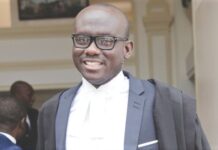
A group calling itself Citizen Movement Against Corruption has weighed in on the disturbing disclosures by the Auditor General at the Economic and Organised Crime Office (EOCO).
StarrFMonline.com Wednesday first reported that the investigatory body was yet to unravel the mystery surrounding an excess transfer of $619,039.16 (GH¢2,748,977) to an applicant following a court order.
The court, according to checks, ordered that US$366,985 and GH¢646,188.35 be paid from the EOCO exhibits Account to an applicant, but an excess of GH¢2.7 million was paid.
Further checks revealed that officials of the investigatory body inflated the dollar amount and paid US$986,024.16 instead of US$366,985, leading to an excess transfer of $619,039.16 “without authority.”
The Auditor General in its 2015 report thus, instructed management of the Investigatory body “to recover the excess funds of $619,039.16 or provide justification for the transfer of the amount.”
Also, the report uncovered that six retired staff of EOCO enjoyed “unearned salaries totaling GH¢22,067.78” between 2013 and 2014, hence a further recommendation “that efforts be made by management to recover the total amount.”
Commenting on the development Thursday on Morning Starr, the Co-Chair of the Citizen Movement Against Corruption Edem Senanu said, “This is very shocking.”
For him, the shock does not only stem from the fact that EOCO was wrong, “but it is scandalous to say that given the fact that the Auditor General apparently reported on this, they do not seem to have taken any action.”
“Sometimes [one] wonders whether institutions of state are taking the citizens of Ghana seriously. This is just too unacceptable for us to begin to comprehend how EOCO itself to be involved in this?” he quizzed.
He said the disclosures at the EOCO is a clear indication that the country’s supervisory structures are weak saying, “If you have an invoice, charged a particular amount and then the amount paid is about 300 percent of what it was required and this has to sit unnoticed until an external body like the Auditor General comes to discover it on the books of EOCO it tells us that supervision is very poor.”




